Theater Feature: Best Stage Productions of 2018
Our theater critics pick some of the outstanding productions of the year.
By The Arts Fuse Staff
Arts Fuse stage critics have come up with a number of standout productions, and the line-up has the merit of being a pleasingly expansive list, including productions from small, medium, and large companies. Feel free to write in and tell us about your favorites — and why they were so good.
Bill Marx
Editor
The Arts Fuse
Best Theater of 2018
At the Independent Reviewers of New England (IRNE), my fellow judges and I cast our votes for the best local and touring productions in February; we post the IRNE winners online in April. Here, in order of their impact, I’ve selected four shows that were some of the best I saw in 2018.
Talisman Roses, by Tennessee Williams. Directed by Marsha Mason. Staged by the Collective NY, at the Tennessee Williams Theater Festival, Provincetown, MA.
This previously unpublished 1937 script was found in a Texas university library by TWTFestival curator/impresario David Kaplan. Marsha Mason’s insightful direction used props minimally: the cast’s three actresses, including acclaimed film star Amanda Plummer, took us into the depths of an institutionalized woman’s life. The script explored how others close to her became ensnared in her troubled orbit.
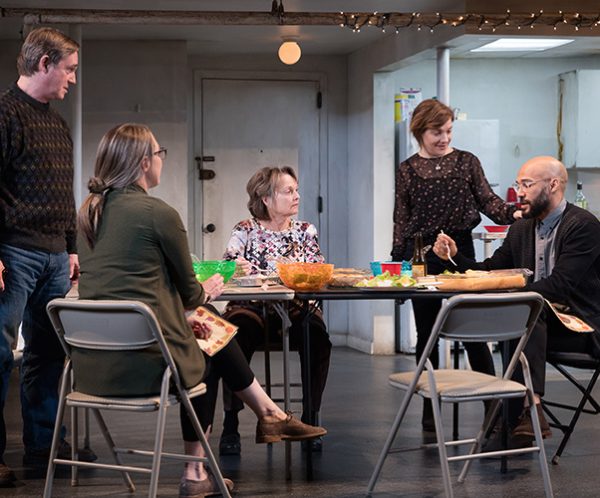
From left: Richard Thomas, Therese Plaehn, Pamela Reed, Daisy Eagan, and Luis Vega in “The Humans.” Photo: Julieta Cervantes.
The Humans, by Stephen Karam. Directed by Joe Mantello. At the Boch Center, Shubert Theatre, Boston, MA
Playwright Stephen Karam, whose Sons of the Prophet was staged in 2011 by the Huntington Theatre Company, returned to Boston this year with The Humans, a heartfelt drama. In it, we met the Blakes, a contemporary American family who are facing a number of challenging issues revolving around employment, debt, and health. The cast, helmed by veteran television actor Richard Thomas, skillfully dramatized the fragile family’s fight against decline.
Between Riverside and Crazy by Stephen Adly Guirgis. Directed by Tiffany Nichole Greene. Staged by SpeakEasy Stage Company, Boston, MA.
Like Stephen Karam, playwright Guirgis focused on people in pursuit of their slice of the American dream. The production featured a strong cast: Tyrees Allen (as Pops), Octavio Chavez-Richmond (as Lulu), and Celeste Olivia (as Church Lady). The trio commanded the stage, generating humor and pathos. This Pulitzer Prize-winning script chronicled the trials and tribulations of scrappy New York City characters engaged in a daily struggle for shelter, dignity, and survival.
WET: A DACAmented Journey, written and performed by Alex Alpharaoh. Presented by ArtsEmerson, Boston,MA.
In his one-act monologue, which reflects today’s headlines, actor/writer Alpharaoh recounts his battle to obtain citizenship, a difficult (and perilous) process faced by most Central Americans seeking asylum in a politically fractured United States. His superb performance dramatized the experience’s sorrow, bravery, heartache, and limited moments of triumph.
— Bob Israel
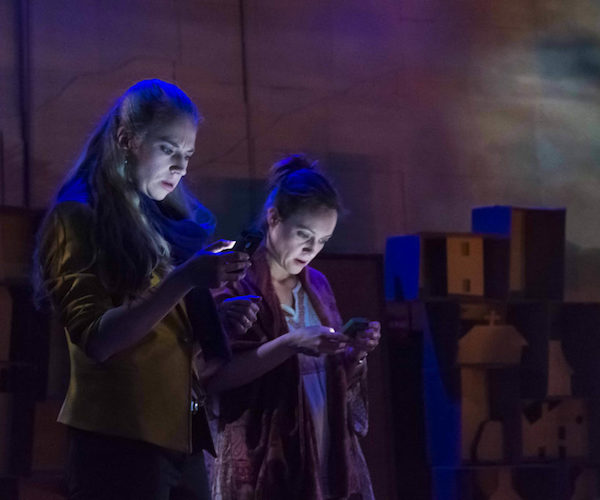
Samantha Richert (left) and Stacy Fischer (right) in the New Rep production of “Ripe Frenzy.”
Photo: Kalman Zabarsky
I ended my best play selection in 2017 with a wish articulated by Dario Fo: “A theatre, a literature, an artistic expression that does not speak for its own time has no relevance.” My hope was that producers would concentrate on more timely work.
I’m happy to report that, in many ways, they did. Ripe Frenzy, a Boston Center for American Performance and New Repertory Theatre co-production, was dramatist Jennifer Barclay’s moving mediation on an incident of gun violence in a high school. The production opened just a couple of weeks after the shooting at Marjory Stoneman Douglas High School in Parkland, Florida. From my review: “Ripe Frenzy isn’t a script about gun control. Neither is it about trying to understand the perpetrators of school shootings. Rather, it’s about the experience of those who are left once the hellish smoke clears. In this case, the mothers, and a quiet and broken student. The mainstream news media and the masses go on to the next shiny disaster; these are the people who are tasked with picking themselves up and somehow trudging on. With school shootings, the pattern has become all too depressingly clear. We are shocked and outraged, concerned and sympathetic, pledging our ‘thoughts and prayers.’ But we let our policy makers do nothing.”
On the other hand, I wasn’t as taken by the Zeitgeist Stage Company’s Trump-satire Vicuña. Jon Robin Baitz’s play felt soft and clunky — even quaint compared to heinous reality. Still, I respect Zeitgeist’s artistic director David J. Miller for choosing it for his season.
I saw several terrific individual performances this year, as well. Tyrees Allen delivered a wrenching turn as Pops, the cog at the center of Speakeasy Stage Company’s Between Riverside and Crazy.
What a delight it was to see Jeremiah Kissel on stage again in Cyrano at the Gloucester Stage Company. The pared-down adaptation of this ‘classic’ (by Jason O’Connell and Brenda Withers) was fun and engaging, but Kissel was the real treat. Another GSC delight: Ken Raif’s My Station in Life, thanks to Ken Baltin’s terrific performance as the moodily stubborn radio station entrepreneur Simon Geller. GSC Artistic Director Bob Walsh deserves credit for selecting both productions and directing them so well.
It was a great year for women on the stage as well. The absolute highlight of Open Theatre Project’s delightful evening of LGBQT plays, Gay Shorts, was Rhea MacCallum’s hilarious A Little Experimenting. It may have been a short play, but it was full of surprises. The performances by Evelyn Holley and Caroline Keeler as mother and daughter were spot-on.
We’re so fortunate to have the Nora Theater and its Artistic Director Lee Mikeska Gardner in Boston. She has selected a number of interesting plays that feature women, and this year’s The Women Who Mapped the Stars (written by Joyce Van Dyke and directed by Jessica Ernst of Poets’ Theatre) was particularly impressive, both because of its feminist theme and the fact that it uncovered an important story (from a century ago) detailing the accomplishment of Cecilia Payne along with women who worked at the Harvard Observatory.
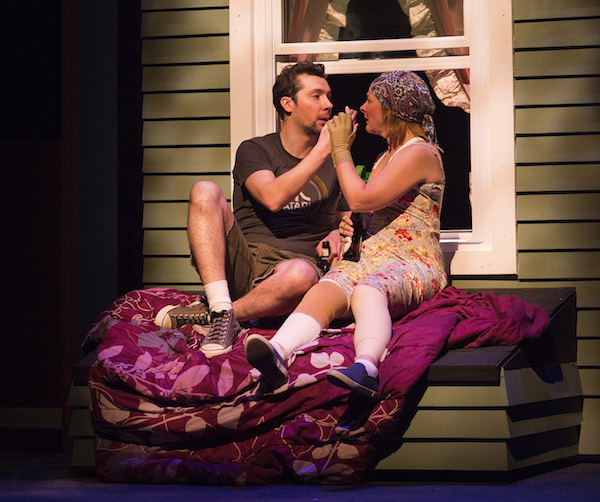
Brad LaBree and Rachel Burttram in the Penobscot Theatre Company production of “Ugly Lies the Bone.” Photo: Magnus Stark.
The best show I reviewed this year was, surprisingly, produced in Bangor, Maine. Penobscot Theatre Producing Artistic Director Bari Newport orchestrated a nearly flawless production of Lindsey Ferrentino’s Ugly Lies the Bone. The play centers on Jess (Rachel Burttram), a veteran recovering from multiple injuries suffered in an explosion while serving in Afghanistan. This powerful play examines the recovery process of injured veterans, probing the use of virtual reality as a means to heal profoundly injured soldiers. But what made the Penobscot Theatre production so memorable was Burttram’s brilliant performance, assisted by Kevin Koski’s wonderful make up and costumes. (The other acting standout last year was Zuzanna Szadkowski in Bedlam’s Uncle Romeo Vanya Juliet — which I did not review for The Arts Fuse.)
— David Greenham
Fun Home. Music by Jeanine Tesori, book and lyrics by Lisa Kron. Based on the graphic novel by Alison Bechdel. Directed by Paul Daigneault. SpeakEasy Stage company, Calderwood Pavilion at the Boston Center for the Arts.
Paul Daigneault and his SpeakEasy team deserve kudos for their terrific staging of Tesori and Kron’s musical version of cartoonist Alison Bechdel’s moving graphic novel about her coming out and coming to terms with the death (a probable suicide) of her closeted gay father. Anchored by the actors playing Alison at three different ages (Marissa Simeqi, Ellie van Amerongen, and Amy Jo Jackson), this beautifully acted, emotionally satisfying production highlighted the musical’s strengths—its sharply witty book, memorable songs, and heartbreaking characters. The show returns with largely the same cast for a three-week run in June 2019. Review.
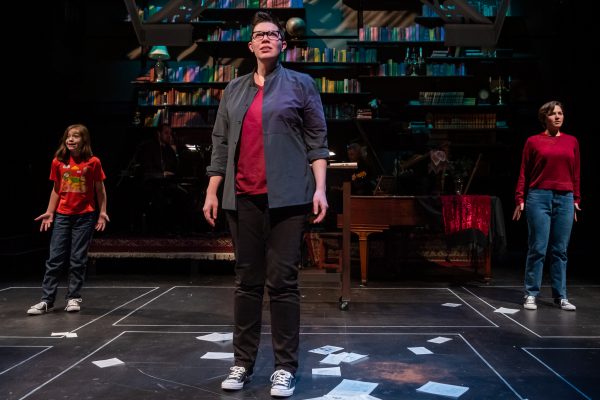
The three Alisons: Marissa Simeqi, Amy Jo Jackson, and Ellie van Amerongen, in SpeakEasy Stage’s production of “Fun Home.” Photo by Nile Scott Studios.
Jagged Little Pill. Music by Alanis Morisette and Glen Ballard, lyrics by Alanis Morissette. Additional music by Michael Farrell and Guy Sigsworth. Book by Diablo Cody. Directed by Diane Paulus. American Repertory Theater, Loeb Drama Center, Cambridge, MA.
In crafting a musical around Canadian singer-songwriter Alanis Morisette’s 1995 hit album, writer Diablo Cody (best known for her screenplay for Juno) crammed a few too many “modern problems” into her book, giving it a ripped from the headlines air in spots. Still, the sharp comic writing, eye-popping visuals, and excellent performances—including Lauren Patten’s electrifying take on “You Oughtta Know,” which reliably brought the audience to its feet mid-act—made this an exciting production. Review.
— Evelyn Rosenthal
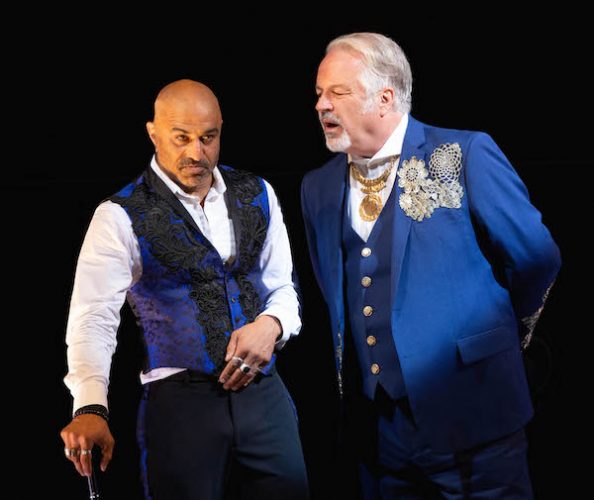
Faran Tahir and Fred Sullivan, Jr in the Commonwealth Shakespeare Company production of “Richard IiI.” Photo: Evgenia Eliseeva.
Out of the twenty plays I reviewed in 2018, here are my top five shows that, for a variety of reasons, managed to stick with me. In no particular order:
Richard III, presented by Commonwealth Shakespeare Company
2018 marked my second full year of reviewing theater for The Arts Fuse and my first time seeing Commonwealth Shakespeare Company’s annual production of a Shakespeare play on the Boston Common. I should have caught on sooner! The staging of Richard III was directed with finesse by Steven Maler, and his cast gave gripping, larger-than-life performances, especially Faran Tahir, who brought gleeful, palpable malevolence to the role of Richard. Not only was CSC’s vision of the Bard’s work original and compelling, but it proved that live theater, even in our age of social media, can still bring the community together for a thrilling emotional experience.
True West, presented by Hub Theatre Company
Sadly, playwright Sam Shepard passed away last year at the age 73. The Hub Theatre Company’s production of his drama True West suggests that his corrosive vision will live on for a good while. Anchored by brilliant acting from Bob Mussett and Victor Shopov, Daniel Borque’s thoughtful direction, and the technical work of a slew of dedicated artists, this production always felt truthful and real. HTC did splendid justice to Shepard’s taut, hilarious tale of sibling rivalry.
We Will Not Be Silent, presented by New Repertory Theatre
David Meyers’ script is a profound and devastating study of fascism, prejudice, and moral resolve. Is it any surprise that an exploration of the White Rose anti-Nazi resistance movement led by German students in World War II rings true today? Outgoing New Rep artistic director Jim Petosa made the most of the play’s trenchant social commentary; he also invested dramatic power in the smallest moments. Rich performances from Sarah Oakes Muirhead and Tim Spears made their commitment to this challenging piece clear.
Murder for Two, presented by Merrimack Repertory Theatre
Sure, the script for Murder for Two has its weak points. But when a show’s this much fun it’s hard to care! Merrimack Rep’s macabre musical murder mystery bowled me over with its comedic inventiveness, powered by the whirlwind energy of Joe Kinosian, whose comedic chops, particularly his knack for vaudeville-style physicality, were exhilarating. Murder for Two is a potent reminder that escapist theater can be outstanding — when it entertains with this kind of riotous panache.
Unveiled, presented by New Repertory Theatre and Greater Boston Stage Company
Another show in the “sadly pertinent to 2018” category, Rohina Malik’s one-woman drama looks at the lives of a variety of Muslim women of differing perspectives and backgrounds. It was an affecting testament to the power of live storytelling. I wish Malik’s play wasn’t quite so short — but the directness and humanity of her performance was never less than moving, a step toward creating broader cultural understanding.
— Erik Nikander
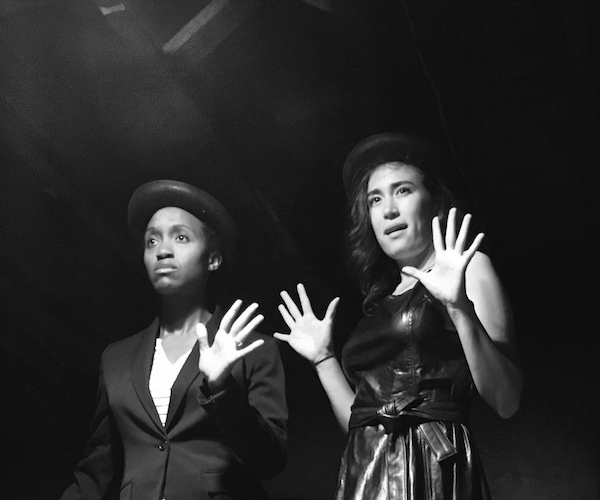
Robin JaVonne Smith and Kathleen Lewis in the Beau Jest Working Theater production of “Journey to the Center of the Stage.” Photo: courtesy of Beau Jest.
I will sound like a broken end-of-the-year record, but I must, again, disagree with David Greenham. He believes we are seeing more relevant work on our stages. Yes, issues raised by racism, identity, gun control, and #Me Too are being explored, and that is admirable. But many of our theaters, particularly those with resources, are afraid to produce plays that tell their audiences disagreeable things. It is a calculated refusal to challenge the liberal pieties so treasured by mainstream media, fat cat donors, and big business. That might partly explain why our theater companies refuse to deal with climate change as well as to tackle other thorny issues, including corporate corruption, the global refugee crisis, the social and spiritual damage wrought by social media, and class and income inequality. This, for me, is a major abdication of theater’s duty to “speak for its own time.” Critic Eric Bentley (who is now 102) demanded that theater be audacious — there’s not enough of that.
Below are a list of my favorite productions of the past year in no particular order. (Keep in mind that teaching full-time at Boston University and editing The Arts Fuse cuts down on my time for attending theater productions.)
Naked by Luigi Pirandello in a new version by Nicholas Wright. Directed by Eric Hill. At The Unicorn Theatre’s Larry Vaber Stage. Good old Pirandello, he is the party pooper at America’s self-improvement whoop-de-doo. He insists that there is no self to improve. A clean and lean production.
Hir by Taylor Mac. Directed by Alice Reagan. Staged by Shakespeare and Company at Elayne P. Bernstein Theatre. A delicious exercise — performed with agile energy — in anarchy about escaping the brutal, dehumanizing clutches of the American Home.
The Niceties by Eleanor Burgess. Directed by Kimberly Senior. Staged by the Huntington Theatre Company at the Calderwood Pavilion at the Boston Center for the Arts. An articulate, if structurally crabbed, expression of #blacklivesmatter anger as well as a millennial rebel yell. The script doesn’t just pay lip service to questioning liberal authority and privilege — it goes right at their self-serving arrogance.
Ada/Ava, written and performed by Manual Cinema. Directed by Drew Dir. Score and Sound Design by Kyle Vegter and Ben Kauffman. The Manual Cinema staging presented by Arts Emerson at Emerson Paramount Center’s Robert J. Orchard Stage. An inspired re-invention of silent cinema/animation, as well as a refreshing modernization of the venerable art of shadow puppetry.
Journey to the Center of the Stage by Larry Coen. Directed by Davis Robinson. Staged by Beau Jest Moving Theater at the Charlestown Working Theater, Charlestown, MA. The Beau Jest Moving Theater cast served up the vaudevillesque antics authored by the late Larry Coen in style.
We The People, Double Edge Theatre’s Summer Spectacle, written and performed by Double Edge Theatre, Ashfield, MA. The company hammers home a message in this piece: past dissidents should be inspirations for the rebels of the present. But it did so via an eye-filling production that drew on the power of space, creating different perspectives by placing the audience in various locations and natural settings.
This Place/Displaced, written by Zahra A. Belyea, Stephanie K. Brownell, Kristen Greenidge, David Valdes Greenwood, MJ Halberstadt, Manuel Aquiles Lopez Torres, Jaymes Sanchez, and Livian Yeh. Directed by Josh Glenn-Kayden. Staged by the Artists’ Theater of Boston at the Charlestown Working Theater, Charlestown, MA. An evening of short plays that pointedly (and at times amusingly) critiqued Boston area gentrification and displacement. The audience discussion at the end of the show was depressing if instructive — Lynn, MA’s international mural competition (The Beyond Walls Festival) was used as a example of how banks and foundations use art to draw in the moneyed class and sweep away the less-well-off.
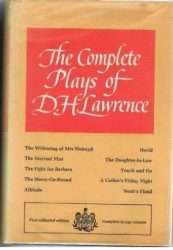
While I was in Portland, ME celebrating my 65th birthday I picked up a prize (for $7) in a used book store: The Complete Plays of D.H. Lawrence. Lawrence’s scripts about working class life have recently been revived in London. Guardian theater critic Michael Billington hailed a May 2018 staging of 1913’s The Daughter-In-Law, asserting that the play is “arguably the best account of working-class life in British drama.” You emerge from the production “marvelling at Lawrence’s achievement in creating a play in which sex, class and industrial politics are effortlessly intertwined.”
“The novel differs fundamentally from drama,” wrote Lawrence in 1928. “The novel is concerned with human beings, and the drama is concerned with events. A drama is what happens, and a novel is what is.” Chances that there will be productions of any of Lawrence’s scripts here? Doubtful. There hasn’t been one, to my knowledge, for the past 35 years. The sad truth is that we aren’t even seeing much Ibsen or George Bernard Shaw these days. Too many words, no doubt.
— Bill Marx
Tagged: Bill-Marx, Bob Israel, David Greenham, Erik Nikander
